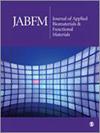新型希夫碱Co(II)配合物:潜在的生物学应用
IF 3.1
4区 医学
Q2 BIOPHYSICS
Journal of Applied Biomaterials & Functional Materials
Pub Date : 2022-09-30
DOI:10.35745/afm2022v02.03.0006
引用次数: 0
摘要
以水杨醛/ 3,4-二氨基苯甲酮为原料,分别与乙酰丙酮和戊二酸酐反应合成了N2O2类钴配合物。配体和单个钴(II)配合物通过光谱数据(傅里叶变换红外,紫外可见,质子和碳-13核磁共振,和质量)被识别。非电解性质的配合物发现,从他们的摩尔电导率(Ω-1cm2mol-1)在DMSO的10-3M溶液。ESR显示配合物的几何形状为八面体。希夫碱钴(II)配合物具有抗癌活性和细胞毒性本文章由计算机程序翻译,如有差异,请以英文原文为准。
Novel Schiff Base Co(II) Complexes: Potential Biological Applications
Cobalt (Co) complexes with the N2O2 category have been created synthetically by the reaction of salicylaldehyde / 3,4-diamino benzophenone with acetylacetone and glutaric anhydride respectively. The ligands and individual Cobalt (II) complexes were recognized through spectroscopical data (Fourier Transform Infrared, Ultra Violet-visible, proton and carbon-13 NMR, & Mass). Non-electrolytic in nature of the complex found from their molar conductivities (Ω-1cm2mol-1) in DMSO of 10-3M solution. The ESR revealed the geometry of the complexes to be octahedral. The Schiff base Cobalt (II) complex was characterized by anticancer activity and cytotoxicity
求助全文
通过发布文献求助,成功后即可免费获取论文全文。
去求助
来源期刊

Journal of Applied Biomaterials & Functional Materials
BIOPHYSICS-ENGINEERING, BIOMEDICAL
CiteScore
4.40
自引率
4.00%
发文量
36
审稿时长
>12 weeks
期刊介绍:
The Journal of Applied Biomaterials & Functional Materials (JABFM) is an open access, peer-reviewed, international journal considering the publication of original contributions, reviews and editorials dealing with clinical and laboratory investigations in the fast growing field of biomaterial sciences and functional materials.
The areas covered by the journal will include:
• Biomaterials / Materials for biomedical applications
• Functional materials
• Hybrid and composite materials
• Soft materials
• Hydrogels
• Nanomaterials
• Gene delivery
• Nonodevices
• Metamaterials
• Active coatings
• Surface functionalization
• Tissue engineering
• Cell delivery/cell encapsulation systems
• 3D printing materials
• Material characterization
• Biomechanics
 求助内容:
求助内容: 应助结果提醒方式:
应助结果提醒方式:


